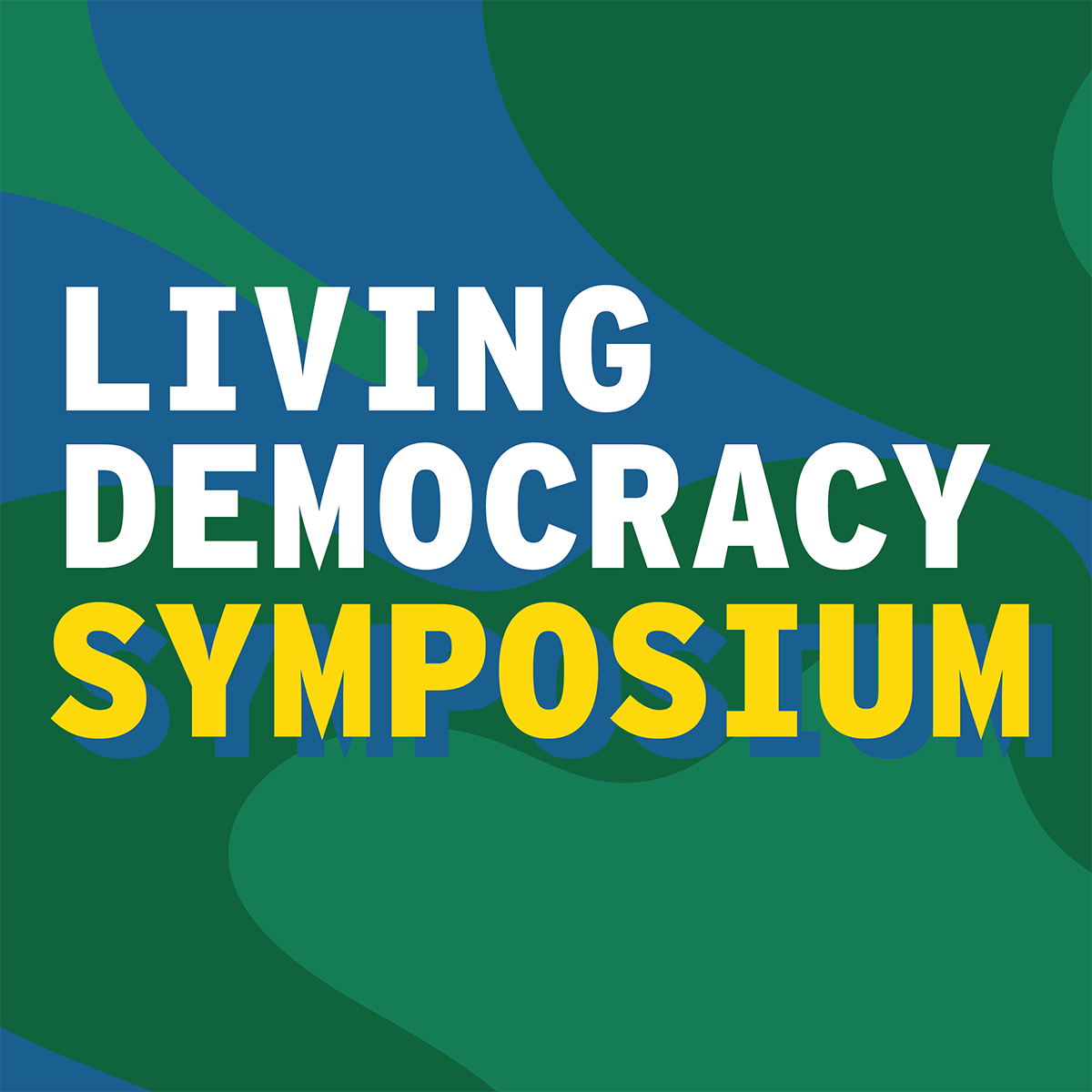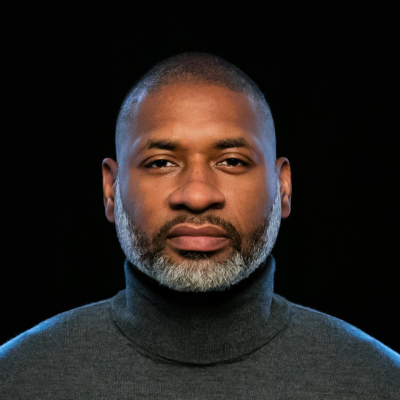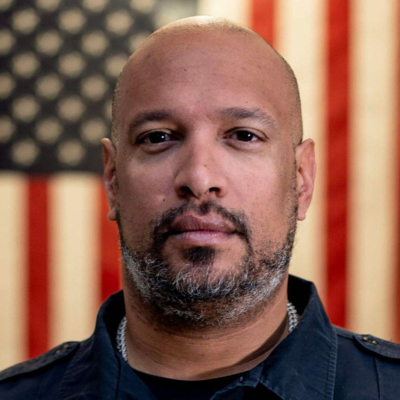Living Democracy Symposium
A day of learning, engagement, and dialogue.
October 10, 2024 | 8:30am–6:30pm
Stamp Student Union, University of Maryland, College Park
 Join UMD Libraries at our interdisciplinary symposium to examine the actions that all of us can take to preserve our democracy. This one-day symposium will provide opportunities for civic discourse, sharing of new perspectives, and learning about the ways that our collective history, ranging from the Watergate scandal to more contemporary narratives, informs our present and future.
Join UMD Libraries at our interdisciplinary symposium to examine the actions that all of us can take to preserve our democracy. This one-day symposium will provide opportunities for civic discourse, sharing of new perspectives, and learning about the ways that our collective history, ranging from the Watergate scandal to more contemporary narratives, informs our present and future.
Get ready for a day of exciting speakers and panel discussions as we examine the importance of civic engagement, activism, intellectual and academic freedom, and journalism in protecting our democratic way of life. Sign up to receive email updates from the Living Democracy Project.
Made possible by a generous gift from the Ilona Modly Hogan Legacy Fund.
Symposium Schedule
| 8:30 a.m. - 9:00 a.m. | Registration and light refreshments |
| 9:00 a.m. - 9:30 a.m. | Opening remarks |
| 9:30 a.m. - 10:30 a.m. | Opening Keynote Address: Charles M. Blow |
| 10:30 a.m. - 10:40 a.m. | Break |
| 10:40 a.m. - 11:40 a.m. | Watergate @ 50 Presentation |
| 11:45 a.m. - 11:55 a.m. | Remarks from the Provost |
11:55 a.m. to 12:30 p.m. | Lunch Featuring Speaker Holly Brewer |
| 12:30 p.m. - 1:30 p.m. | Panel: Fostering Civility in the Public Square |
| 1:30 p.m. - 2:30 p.m. | Panel: The Fourth Estate |
| 2:30 p.m. - 2:45 p.m. | Break |
| 2:45 p.m. - 3:45 p.m. | Panel: Libraries' Role in Fostering Critical Information Literacy - Nurturing Democracy through Informed Citizenship |
| 3:45 p.m. - 4:45 p.m. | Panel: Activism From the Streets to the Ivory Tower |
| 4:45 p.m. - 5:15 p.m. | Break and Hors d'oeuvres |
| 5:15 p.m. - 6:20 p.m. | Closing Keynote Address: Harry Dunn |
| 6:20 p.m. - 6:30 p.m. | Closing Remarks and Thanks |
Keynote, Panel, and Presentation Information
 Columnist, New York Times bestselling author, and MSNBC Analyst Charles Blow fearlessly tackles today’s most pressing issues with depth, nuance, and tremendous insight. Now an Op-Ed columnist at The New York Times, Blow previously served as the paper’s Graphics Director, leading The Times to significant awards. He has also worked as the Art Director of National Geographic Magazine, and for The Detroit News. Blow is The New York Times bestselling author of "Fire Shut Up in My Bones," which won a Lambda Literary Award, the Sperber Prize, and appeared on numerous “best of” lists. A memoir, the book was called “searing and unforgettable” by People Magazine and was adapted into a critically-acclaimed opera with a groundbreaking run at The Metropolitan Opera – the first performance of an opera there by a Black composer. His second book, "The Devil You Know: A Black Power Manifesto," draws on both his personal experience and observations of society to call for an end to systemic racism. Blow is a prolific and insightful commentator on politics, public opinion, and social justice, often challenging those in power with clarity and candor.
Columnist, New York Times bestselling author, and MSNBC Analyst Charles Blow fearlessly tackles today’s most pressing issues with depth, nuance, and tremendous insight. Now an Op-Ed columnist at The New York Times, Blow previously served as the paper’s Graphics Director, leading The Times to significant awards. He has also worked as the Art Director of National Geographic Magazine, and for The Detroit News. Blow is The New York Times bestselling author of "Fire Shut Up in My Bones," which won a Lambda Literary Award, the Sperber Prize, and appeared on numerous “best of” lists. A memoir, the book was called “searing and unforgettable” by People Magazine and was adapted into a critically-acclaimed opera with a groundbreaking run at The Metropolitan Opera – the first performance of an opera there by a Black composer. His second book, "The Devil You Know: A Black Power Manifesto," draws on both his personal experience and observations of society to call for an end to systemic racism. Blow is a prolific and insightful commentator on politics, public opinion, and social justice, often challenging those in power with clarity and candor.
Heralded for his forward-thinking coverage of American politics and society, as well as his skill in graphic design to create powerful narratives with compelling visuals, Blow is also an in-demand speaker and gifted moderator. He has appeared on "The Late Show with Stephen Colbert," SalonTV, CBS News, and regularly as an analyst on MSNBC, and has been featured in The Washington Post, The Ringer, Oprah Daily, and more about his highly acclaimed work. An advocate for social justice and racial equity, Blow speaks about income inequality, xenophobia, and mental health, generating impactful conversations that resonate with audiences of all kinds.
This panel will feature remarks by Illona Hogan, a presentation by Irene M. Lewis, a coordinator in UMD Libraries' Special Collections and University Archives, and a short panel discussion with Ilona Hogan, Breanna Gray (Assistant Professor, Department of Government and Politics, University of Maryland, College Park), and Trevor Parry-Giles (Associate Dean for Faculty Affairs and Research, College of Arts and Humanities, University of Maryland, College Park).
The concept of political discussion conjures a myriad of feelings and opinions regarding current events that draw passionate and at times aggressive debate from those with conflicting viewpoints. Polarization on the viewpoints of individuals have become commonplace, hindering the creation of effective public policy to address the needs of the electorate. These impassioned debates often become a detractor to citizen engagement and participation in the democratic process, from local school board elections up to the presidential election.
This section seeks to provide insight into the thoughts and processes that will help foster respectful public engagement from various viewpoints and reestablish confidence in levels of government service and community partnerships in the creation of public policy.
Moderator:
Raymond Rodriguez, UMD School of Public Policy Alum
Panelists:
John Carroll, Mayor of Galena, Maryland; President of Maryland Municipal League
Fazlul Kabir, Mayor of College Park, Maryland
The First Amendment of the U.S. Constitution guarantees freedom of the press, a cornerstone for American democracy and the rule of law, recognizing the press's critical role in these arenas. Thomas Jefferson famously valued the press over the government itself, emphasizing its importance in reflecting public opinion. The press has evolved significantly from traditional newspapers to include broadcast journalism and online media, demonstrating its crucial role during pivotal moments in history, such as the Watergate crisis.
However, the press faces increasing threats, from historical attacks on printing presses to contemporary accusations of being "the enemy of the people" by significant political movements. The advent of cable broadcasting, the internet, and social media has disrupted traditional news gatekeeping, leading to a loss of newspapers and the spread of misinformation alongside legitimate news. The emergence of AI presents new challenges, raising questions about the future ability of the press to sustain its essential role in democracy and the rule of law amidst these disruptions and threats.
Moderator:
Robin Sundaramoorthy, Faculty Specialist, UMD Philip Merrill College of Journalism
Panelists:
Christoph Mergerson, Assistant Professor, UMD Philip Merrill College of Journalism
Kirsten Eddy, Senior Researcher, Pew Research Center
Sarah Oates, Professor, UMD Philip Merrill College of Journalism
The panel discussion seeks to investigate the pivotal role that libraries play in advancing critical information literacy and its impact on fostering a robust democracy. The dialogue will explore how libraries function as dynamic environments that nurture well-informed citizens capable of actively engaging in democratic processes.
Critical information literacy (CIL) extends beyond conventional information literacy by placing emphasis on critical thinking, social justice, and an awareness of power structures within information systems. It entails the capacity to assess information critically, analyze it, and apply it in a manner that considers the social, cultural, and political contexts surrounding information creation, distribution, and utilization. Critical information literacy encourages individuals to question sources of information, discern bias, and comprehend the broader implications of information within society.
Moderator:
Twanna Hodge, UMD doctoral student, College of Information Studies
Panelists:
Ana Ndumu, UMD Assistant Professor, College of Information Studies
Meredith Evans, Director, Jimmy Carter Library
Paul R. Carr, Professor, Université du Québec en Outaouais
Ricky Blissett, UMBC Associate Director
Activism, a cornerstone of civic engagement, has historically played a pivotal role in shaping social and political movements. It embodies the collective effort of individuals and communities to challenge the status quo, advocating for equality, justice, and the end of structural racism across various facets of society, including civil rights for all sexual orientations. This pursuit of change is deeply rooted in democratic values, emphasizing the importance of public advocacy for societal redress. In recent times, activism has evolved, incorporating non-traditional methods such as data science to promote the fair treatment of marginalized communities, particularly Black and Brown individuals. Moreover, the advent of social media has revolutionized the way activism is conducted, offering a platform to democratize narrative control and enhance the impact of social and political organizing. This panel on activism and democracy aims to explore activism through the lens of leadership in academia and its multifaceted representation in the ivory tower along with the often overlooked means in which organizers are perhaps some of the greatest leaders and protectors of democracy.
Moderator:
Kristy (Kristine) Li Puma, UMD doctoral student/GA, American Studies
Panelists:
Saba Tshibaka, UMD alumna
Bayley Marquez, UMD Assistant Professor, American Studies
Micaylah Jones, UMD Graduate Coordinator for Black Student Involvement and Advocacy
 On January 6, 2021, he was one of the brave officers who protected the country as a mob of insurrectionists attacked the Capitol in an attempt to overturn the presidential election. In 2021, Harry Dunn and three other law enforcement officers testified before the bipartisan January 6th Commission, where he shared his harrowing account of what he experienced that day.
On January 6, 2021, he was one of the brave officers who protected the country as a mob of insurrectionists attacked the Capitol in an attempt to overturn the presidential election. In 2021, Harry Dunn and three other law enforcement officers testified before the bipartisan January 6th Commission, where he shared his harrowing account of what he experienced that day.
January 6th was a frightening wake up call for our democracy, and our democracy is still standing because Dunn and his fellow officers stood their ground. In recognition of Officer Dunn’s role in protecting the U.S. Capitol, President Joe Biden awarded him the Presidential Citizens Medal.
During his 15 years with the Capitol Police, Harry Dunn provided security for scores of major events at the Capitol, including presidential inaugurations, joint sessions of Congress, and State of the Union addresses. Dunn served as a Crisis Intervention Officer responsible for assisting individuals who may be experiencing a mental crisis, and as a member of Capitol Police Crisis Negotiation Teams trained to respond to hostage or barricade situations. He worked to promote equity, diversity, and inclusion within the Capitol Police force, and received accolades for his exemplary service, including the Capitol Police Service Medal, the Capitol Police Achievement Medal, a Capitol Police Commendation, and a Congressional Gold Medal. He recently published his New York Times bestselling memoir, "Standing My Ground," and in January 2024, he announced his candidacy for Maryland’s 3rd Congressional District.
We are grateful to the more than 35 individual donors who have supported the Living Democracy Initiative.
Join Us in This Endeavor
Become a Symposium Sponsor.
Your support is not just a financial contribution; it's an investment in the discourse and actions necessary to strengthen our democracy. We believe that your organization's values are a perfect match with the goals of this symposium, and your participation will significantly enhance the impact of this event.
Levels of Support: We are requesting co-sponsorship at various levels of commitment, each offering unique opportunities for recognition and impact:
- Bumper Sticker ($200-$500): Your donation will support marketing and promotional materials, adding a tangible touch to the symposium’s valuable contributions.
- Ballot Box ($1,000-$2,500): Contributions at this level will help cover essential event costs, such as catering, room rental fees, and equipment, ensuring a comfortable and professional environment for all participants.
- Speaking of Impact ($3,000-$5,000): This level of support will help us provide honoraria, travel, and lodging for our featured speakers, attracting high-caliber voices and expertise to the symposium.
- Podium Power ($6,000-$10,000): At this premier level, your sponsorship will support our opening and closing keynote speakers. “Podium Power” supporters will also receive a special invitation to the pre-symposium dinner, Vanguards of Democracy, which will be held on October 9, 2024, at The Hotel in College Park.
Why Your Support Matters: Your co-sponsorship will help to empower critical conversations and connections among diverse voices – including the press, student leaders, historians, community activists, technologists, and more. These discussions are essential for understanding and exercising our power to strengthen democracy.
For Your Support: With deep gratitude, all co-sponsors will be recognized on the UMD Libraries’ website and in symposium materials, while "Speaking of Impact" and "Podium Power" co-sponsors will be acknowledged during the dinner and on the day of the symposium. We hope you'll take this opportunity to associate your unit with a meaningful day of dialogue in advance of the 2024 election.
For additional information and/or to confirm your support, please contact Lae'l Hughes-Watkins at laelhwat@umd.edu.
Accessibility
This event is open to the public. UMD Libraries welcomes individuals with disabilities to participate in its programs and activities. If you have questions about the access provided or would like to request accommodations, please contact libadmin@umd.edu. For some types of accommodations, including securing an ASL interpreter, the Libraries may need two to four weeks of advance notice.









